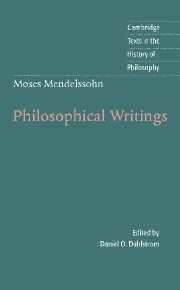Book contents
- Frontmatter
- Contents
- Acknowledgments
- Introduction
- Chronology
- Further reading
- Note on texts and translation
- Philosophical writings
- Preface
- Part I
- Part II
- On evidence in metaphysical sciences
- On the ability to know, the ability to feel, and the ability to desire
- On the question: what does “to enlighten” mean?
- Index
- Cambridge texts in the history of philosophy
On evidence in metaphysical sciences
Published online by Cambridge University Press: 05 June 2012
- Frontmatter
- Contents
- Acknowledgments
- Introduction
- Chronology
- Further reading
- Note on texts and translation
- Philosophical writings
- Preface
- Part I
- Part II
- On evidence in metaphysical sciences
- On the ability to know, the ability to feel, and the ability to desire
- On the question: what does “to enlighten” mean?
- Index
- Cambridge texts in the history of philosophy
Summary
Introduction
The criticism is commonly advanced against philosophy that, in its doctrines, no particular conviction is ever to be hoped for since in every century new systems rise up and glimmer for a while only to pass away in turn. In our days the poems, the speeches, the historical and critical writings, the statues, and other artworks of the ancients are still admired as masterpieces, and, to a degree, more is to be gained from the study of them than from the study of nature itself. In philosophy, however, the words of the past have become almost useless in the present day. To be sure, the most famous systems still contain some useful materials, but, as is commonly believed, they are not worth the trouble of searching through the ruins and digging up the rubble that covers them. It is inferred from this that taste or the sentiment of beauty and order is far more durable and reliable than reason or convictions about philosophical truths. For taste has preserved itself in much the same way since Homer while reason changes its shape with every age of humanity, and, hence, the former must be more certain and less subject to doubt than the latter.
- Type
- Chapter
- Information
- Moses Mendelssohn: Philosophical Writings , pp. 251 - 306Publisher: Cambridge University PressPrint publication year: 1997

